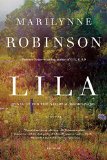Book Club Discussion Questions
In a book club? Subscribe to our Book Club Newsletter!
For supplemental discussion material see our Beyond the Book article, Child Abandonment Syndrome and our BookBrowse Review of Lila.
Please be aware that this discussion guide will contain spoilers!
- The novel's opening paragraphs vividly capture the deprivations experienced by young Lila. How do these experiences affect her immersion in the culture of Gilead? As she reaches adulthood, what does Lila believe about the nature of life?
- How did your perception of Doll shift throughout the novel? What motivates her to rescue Lila? What do the two girls teach each other about loyalty and its limitations?
- Lila recalls the day she ventured into John Ames's candlelit church (echoing Ames's tender recollection of that scene, which was presented in Gilead). Doane had told Lila, "Churches just want
your money," yet she needed refuge. What does Ames's church want from Lila?
- As she copies difficult passages from the Bible, Lila continually returns to questions about human suffering and misfortune. What is your response to this debate? How does Lila's practical wisdom compare to the philosophical wisdom of Ames and Boughton?
- What is the significance of Doll's knife—both literally (as a weapon) and as a metaphor? Can someone from Ames's world of gentleness have the capacity to understand what the knife means to Lila?
- What lies at the heart of Lila and Ames's decision to marry? What needs and longings do they share? How does their relationship reflect the broader needs and longings of humanity?
- Which of the novel's Bible quotations resonated most strongly with you? How were you taught to approach a sacred text?
- Does the age difference between Lila and Ames create an imbalance in their marriage?
- How is Lila's sense of self affected by her days in St. Louis? Was she wounded or empowered by that chapter of her life?
- While Gilead and Home emphasize the relationships between fathers and their children (particularly their sons), Lila accentuates the perspective of women. How does this affect the storyline and the imagery?
- What beliefs does Doll instill in Lila about nurturing a child?
- Discuss the time and place depicted in Lila. What were your family's circumstances during the mid-twentieth century? Is contemporary America less connected to the natural world and to the
contemplative aspects of life? What insight can an urban reader in the information Age gain from Lila and Ames?
- Discuss the concept of trust as it plays out in Lila. What are the characters' greatest barriers to trust? What does it take to quell such fear? Is it as simple as sharing all that we know—especially
our most vulnerable moments? In the novel, how is trust distinguished from faith?
- How does Lila reconcile her husband's religious views with her life before she arrived in Gilead? Does she undergo a conversion in Gilead or does she arrive at something else entirely?
- What do the closing lines of Lila tell us about life, and the absence of life?
Unless otherwise stated, this discussion guide is reprinted with the permission of Picador.
Any page references refer to a USA edition of the book, usually the trade paperback version, and may vary in other editions.
